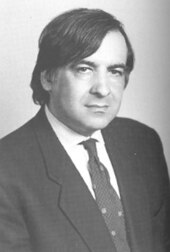La Rete
La Rete (long form: Movimento per la Democrazia - La Rete ; German: Movement for Democracy - Das Netz ) was a party in Italy that existed from 1991 to 1999. It was founded and led by the then mayor of Palermo , Leoluca Orlando .
history
La Rete was founded on January 24, 1991 as an anti- mafia movement. Its founder, Leoluca Orlando, was mayor of Palermo at that time and with this founding he set himself apart from his old party, the Democrazia Cristiana , which was increasingly entangled with the Cosa Nostra . The founding program of La Rete was based on a "mixture of Christian values, anti-Mafia ideals, Puritan morality and libertarianism ", with the specifically Catholic elements being toned down over time. Orlando did not want La Rete to be understood as a party in the traditional sense, but as a “network”, a “new political subject” and a “movement for democracy”.
The party first ran for the regional elections in Sicily in June 1991, in which they came fourth with 7.4% of the vote and 5 of the 90 seats in the regional parliament. Most of the votes came from Orlando's hometown of Palermo, where La Rete got 16.3%. La Rete's gains came mainly at the expense of the Left Democrats (PDS; successor to the Communist Party ) and the neo-fascist MSI , but not the Christian Democrats. In the Italian parliamentary elections in 1992 , La Rete ran for the first time at national level and received 1.9% of the vote (0.7% in the Senate election), which was reflected in 12 MPs and three Senate mandates.
In the first direct election of the mayor in Palermo, Leoluca Orlando, who was supported not only by La Rete but also by the PDS, the Greens and citizens' groups, won with 75% of the vote. In the simultaneous local election, La Rete's list became the strongest force in the local council with 32.6%. For the parliamentary election in 1994 she joined the left-wing electoral alliance Alleanza dei Progressisti, led by the PDS. She again received 1.9% of the vote, which resulted in only eight seats in the Chamber of Deputies, but six senators due to the new electoral law. In the European elections in the same year , La Rete got 1.1%, enough for a seat in the European Parliament. This was taken by Orlando, who joined the group The Greens .
In the spring of 1995 La Rete joined the center-left alliance L'Ulivo under the leadership of Romano Prodi . For the 1996 general election , La Rete did not run with a list, but only with direct candidates and received three seats in the House of Representatives, one in the Senate. La Rete supported the Prodi government, but was not represented in its cabinet . In the Sicilian regional election that same year, the party dropped to 3.6%. In Palermo, however, Leoluca Orlando was re-elected as mayor in 1997 (albeit “only” with 58.6%) and La Rete received 19.6% of the vote in the local elections. On February 27, 1999 , La Rete joined forces with other groups to form the liberal I Democratici party , which three years later became Democrazia è Libertà - La Margherita .
literature
- John M. Foot: The 'Left Opposition' and the crisis. Rifondazione Comunista and La Rete. In: Stephen Gundle, Simon Parker: The New Italian Republic. From the Fall of the Berlin Wall to Berlusconi. Routledge, London / New York, 1996, pp. 173-188.
